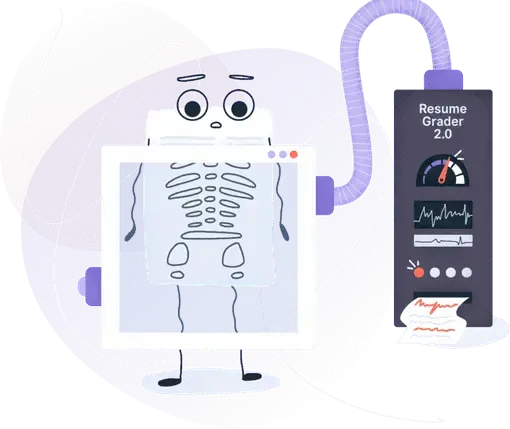Manufacturing Skills: Example Usage on Resumes, Skill Set & Top Keywords in 2025
Highlighting manufacturing skills on your resume indicates to recruiters your ability to manage intricate production processes and reflects your problem-solving capabilities. Delve into the guide below for inspiration to craft an effective resume, exploring synonyms and varied expressions to showcase your expertise.


Is your resume ATS-friendly?
Drop your resume here or upload a file to find out if the skills in your resume are readable by an ATS.
A manufacturing skill refers to the ability to create products from raw materials through various processes such as assembling, machining, or processing. Having this skill on your resume indicates to employers that you are capable of handling production activities and are familiar with the methods required to produce goods. Adding manufacturing proficiency to your resume can be particularly appealing in industries such as automotive, electronics, or textiles, where creating items efficiently and consistently is critical to success.
However, there are some disadvantages to listing manufacturing as a skill on your resume if you're not seeking a job in a related field. It can suggest that you are only suited for a specific sector, potentially making it harder to branch out into different areas of work. Instead of just listing "manufacturing," it's often more beneficial to highlight specific, transferable skills you've gained from that experience, such as problem-solving, attention to detail, or the ability to work with various machinery. These skills are more adaptable to different job settings and can show potential employers that you have a diverse skill set.
In this article, you will learn:
- The downsides of adding manufacturing skills to your resume if they're not relevant to the job you're applying for.
- How to list transferable skills gained from manufacturing experience to broaden your appeal across various industries.
- Good and bad examples of how to display manufacturing skills on your resume, along with synonyms and alternative phrasing.
Misusage of Manufacturing on Resumes
In your resume, accurately presenting your manufacturing skills can make the difference between landing an interview or missing the opportunity. Avoid exaggerating your abilities or misrepresenting your level of expertise. Employers look for candidates who clearly and honestly convey their qualifications, so it's essential that your resume reflects your true manufacturing skill set without overstatement or error.
- Summary section example: Incorrectly claiming to have "revolutionized production processes leading to a 70% cost reduction" when you simply followed a new standard procedure can be considered a misuse of manufacturing skills.
- Experience section example: Stating you "managed a team of 50 factory workers" when you actually supervised a small group can misrepresent your leadership and teamwork skills within a manufacturing context.
- Achievements section example: Asserting you "increased machine uptime from 50% to 100%" without disclosing that this improvement was a result of equipment upgrades and not your skill can mislead potential employers about your problem-solving capabilities.
How to Demonstrate Manufacturing Skills on Your Resume
- List specific technical skills relevant to manufacturing, such as CNC operation, welding, or quality control processes.
- Explain involvement in process improvements or efficiency increases with concrete examples, like how you reduced waste by a certain percentage.
- Highlight any experience with manufacturing software or tools, such as CAD/CAM software, ERP systems, or lean manufacturing techniques.
- Showcase any certifications or additional training you have completed that are applicable to manufacturing roles, such as a Six Sigma Green Belt or a certificate in Production and Inventory Management.
- Detail any past projects where you successfully met production targets or contributed to a team effort in producing high-quality products.
Example 1: Demonstrate manufacturing in the experience section
- •Led a team of 50 in the assembly line, boosting production efficiency by 20% through strategic workflow enhancements.
- •Implemented a new inventory tracking system that reduced material waste by 15%, significantly cutting costs.
- •Oversaw the integration of advanced robotics, contributing to a 25% increase in output without compromising quality.
- •Collaborated with cross-functional teams to develop a new chip fabrication process, reducing production time by 30%.
- •Played a key role in a project that improved product yield from 90% to 95%, ensuring client satisfaction and repeat business.
- •Championed the adoption of sustainable manufacturing practices, resulting in a 10% decrease in energy usage.
- •Implemented a comprehensive quality control system that reduced defects by 40%, exceeding industry standards.
- •Delivered extensive training programs to staff, achieving a consistent improvement in product quality and staff performance.
- •Initiated a feedback loop with the engineering team to refine designs, resulting in a 50% reduction in rework incidents.
- Start by including the job title and the company name to show a clear career progression.
- For each position, use bullet points to convey your responsibilities and achievements.
- Highlight improvements made, showing numerical results to provide context and scale of the accomplishments.
- Describe work in various situations, from leading teams to implementing systems and ensuring quality standards.
- Include relevant dates and locations to provide a timeframe and geographical context of your experience.
Example 2: Demonstrate manufacturing in the summary section
- Demonstrates clear experience with over a decade in the field.
- Highlights a significant career accomplishment of boosting production output.
- Focuses on tangible results, like cost-saving and quality maintenance, which are key in manufacturing.
- Expresses a dedication to continuous learning, which is vital for staying relevant.
- Describes leadership and teamwork abilities through the success of guiding a team effectively.
- Avoids common buzzwords and phrases, presenting skills and experience in a matter-of-fact manner.
Example 3: Demonstrate manufacturing in the achievements section
- Concrete numbers and results show measurable success.
- Descriptions reflect practical situations from past experiences.
- Clear and concise language makes the content easily understandable.
- The use of simple words ensures accessibility to a wider audience.
- The absence of buzzwords makes the achievements more authentic.
- Each achievement is framed to demonstrate a specific skill and its impact.
- Direct and factual statements provide clear value without fluff.
What Are the Relevant Certifications for Manufacturing Skills on Resume
If you're aiming to stand out in the manufacturing field, consider obtaining these reputable certifications.
The top 5 certifications for gaining manufacturing skills expertise:
Top skills people add together with manufacturing skill on resume:
Lean Manufacturing
Six Sigma
Process Improvement
Quality Control
Supply Chain Management
CAD Design
Project Management
Operations Management
CNC Programming
Production Planning
Problem Solving
Attention to Detail
Team Leadership
Time Management
Communication
Adaptability
Critical Thinking
Work Ethic
Project Coordination
Technical Writing
Continuous Learning
Most Relevant Jobs for Manufacturing Skills
If you have skills in manufacturing, there's a wide range of roles you could pursue. The hands-on nature of these jobs means you'll often work on the production floor, handling equipment, interpreting blueprints, and ensuring the making of high-quality products. Whether you're operating machinery, managing processes, or improving production techniques, these positions are crucial in the creation of goods. Your role can have a direct impact on efficiency, safety, and product innovation.
- Assembly line worker
- Quality control inspector
- Production supervisor
- Machine operator
- Maintenance technician
- Manufacturing engineer
- Process improvement specialist
- Industrial designer
- Welder
- CNC machinist
Key Takeaways
- Manufacturing skill enhances your resume by showcasing your ability to work efficiently in production environments.
- Avoid misusing this skill by being aware of common mistakes such as overestimating capabilities or neglecting teamwork.
- Showcase your manufacturing skill on your resume by including specific examples of your experience, relevant certifications, and measurable achievements.
Make one that's truly you.




